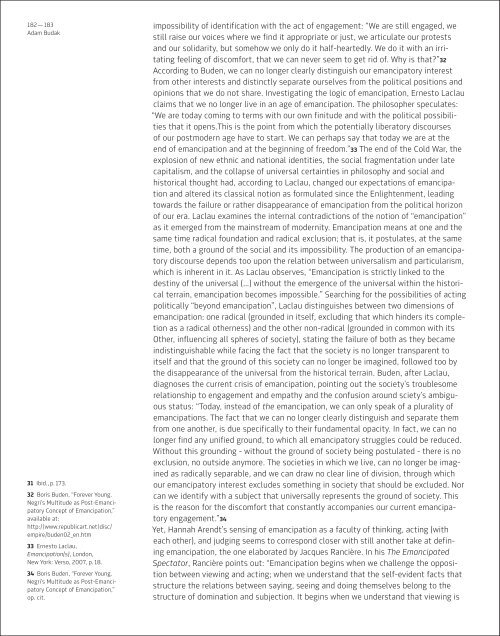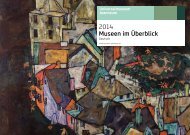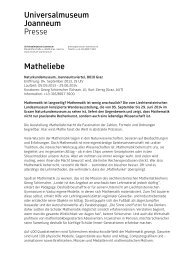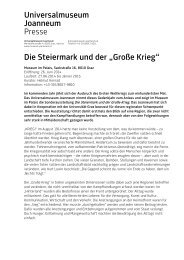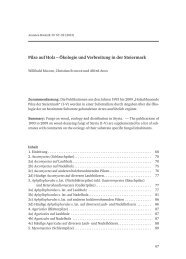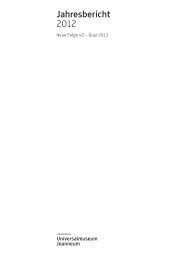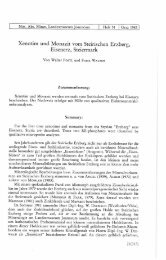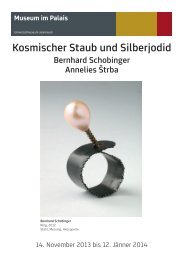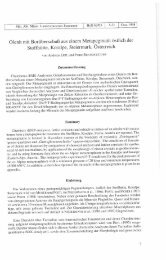Human Condition - Universalmuseum Joanneum
Human Condition - Universalmuseum Joanneum
Human Condition - Universalmuseum Joanneum
Erfolgreiche ePaper selbst erstellen
Machen Sie aus Ihren PDF Publikationen ein blätterbares Flipbook mit unserer einzigartigen Google optimierten e-Paper Software.
182 — 183<br />
Adam Budak<br />
31 Ibid., p. 173.<br />
32 Boris Buden, “Forever Young.<br />
Negri’s Multitude as Post-Emancipatory<br />
Concept of Emancipation,”<br />
available at:<br />
http://www.republicart.net/disc/<br />
empire/buden02_en.htm<br />
33 Ernesto Laclau,<br />
Emancipation(s), London,<br />
New York: Verso, 2007, p. 18.<br />
34 Boris Buden, “Forever Young.<br />
Negri’s Multitude as Post-Emancipatory<br />
Concept of Emancipation,”<br />
op. cit.<br />
impossibility of identification with the act of engagement: “We are still engaged, we<br />
still raise our voices where we find it appropriate or just, we articulate our protests<br />
and our solidarity, but somehow we only do it half-heartedly. We do it with an irritating<br />
feeling of discomfort, that we can never seem to get rid of. Why is that?”32<br />
According to Buden, we can no longer clearly distinguish our emancipatory interest<br />
from other interests and distinctly separate ourselves from the political positions and<br />
opinions that we do not share. Investigating the logic of emancipation, Ernesto Laclau<br />
claims that we no longer live in an age of emancipation. The philosopher speculates:<br />
“We are today coming to terms with our own finitude and with the political possibilities<br />
that it opens.This is the point from which the potentially liberatory discourses<br />
of our postmodern age have to start. We can perhaps say that today we are at the<br />
end of emancipation and at the beginning of freedom.”33 The end of the Cold War, the<br />
explosion of new ethnic and national identities, the social fragmentation under late<br />
capitalism, and the collapse of universal certainties in philosophy and social and<br />
historical thought had, according to Laclau, changed our expectations of emancipation<br />
and altered its classical notion as formulated since the Enlightenment, leading<br />
towards the failure or rather disappearance of emancipation from the political horizon<br />
of our era. Laclau examines the internal contradictions of the notion of “emancipation”<br />
as it emerged from the mainstream of modernity. Emancipation means at one and the<br />
same time radical foundation and radical exclusion; that is, it postulates, at the same<br />
time, both a ground of the social and its impossibility. The production of an emancipatory<br />
discourse depends too upon the relation between universalism and particularism,<br />
which is inherent in it. As Laclau observes, “Emancipation is strictly linked to the<br />
destiny of the universal (…) without the emergence of the universal within the historical<br />
terrain, emancipation becomes impossible.” Searching for the possibilities of acting<br />
politically “beyond emancipation”, Laclau distinguishes between two dimensions of<br />
emancipation: one radical (grounded in itself, excluding that which hinders its completion<br />
as a radical otherness) and the other non-radical (grounded in common with its<br />
Other, influencing all spheres of society), stating the failure of both as they became<br />
indistinguishable while facing the fact that the society is no longer transparent to<br />
itself and that the ground of this society can no longer be imagined, followed too by<br />
the disappearance of the universal from the historical terrain. Buden, after Laclau,<br />
diagnoses the current crisis of emancipation, pointing out the society’s troublesome<br />
relationship to engagement and empathy and the confusion around sciety’s ambiguous<br />
status: “Today, instead of the emancipation, we can only speak of a plurality of<br />
emancipations. The fact that we can no longer clearly distinguish and separate them<br />
from one another, is due specifically to their fundamental opacity. In fact, we can no<br />
longer find any unified ground, to which all emancipatory struggles could be reduced.<br />
Without this grounding - without the ground of society being postulated - there is no<br />
exclusion, no outside anymore. The societies in which we live, can no longer be imagined<br />
as radically separable, and we can draw no clear line of division, through which<br />
our emancipatory interest excludes something in society that should be excluded. Nor<br />
can we identify with a subject that universally represents the ground of society. This<br />
is the reason for the discomfort that constantly accompanies our current emancipatory<br />
engagement.”34<br />
Yet, Hannah Arendt’s sensing of emancipation as a faculty of thinking, acting (with<br />
each other), and judging seems to correspond closer with still another take at defining<br />
emancipation, the one elaborated by Jacques Rancière. In his The Emancipated<br />
Spectator, Rancière points out: “Emancipation begins when we challenge the opposition<br />
between viewing and acting; when we understand that the self-evident facts that<br />
structure the relations between saying, seeing and doing themselves belong to the<br />
structure of domination and subjection. It begins when we understand that viewing is


